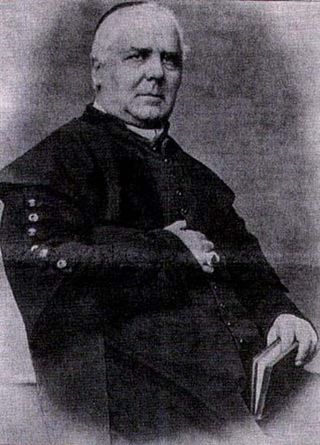Related Research Articles

Angela Merici was an Italian Catholic religious educator who founded the Company of St. Ursula in 1535 in Brescia, in which women dedicated their lives to the service of the church through the education of girls.

The Ursulines, also known as the Order of Saint Ursula, is an enclosed religious order of women that in 1572 branched off from the Angelines, also known as the Company of Saint Ursula. The Ursulines trace their origins to the Angeline foundress Angela Merici and likewise place themselves under the patronage of Saint Ursula. While the Ursulines took up a monastic way of life under the Rule of Saint Augustine, the Angelines operate as a secular institute. The largest group within the Ursulines is the Ursulines of the Roman Union.

Mary Ward, IBVM CJ was an English Catholic religious sister whose activities led to the founding of the Congregation of Jesus and the Institute of the Blessed Virgin Mary, better known as the Sisters of Loreto. There is now a network of around 200 Mary Ward schools worldwide. Ward was declared venerable by Pope Benedict XVI on 19 December 2009.

The Ursuline Monastery of Quebec City was founded by a missionary group of Ursuline nuns in 1639 under the leadership of Mother Marie of the Incarnation, O.S.U. It is the oldest institution of learning for women in North America. Today, the monastery serves as the General Motherhouse of the Ursuline Sisters of the Canadian Union. The community there also operates an historical museum and continues to serve as a teaching centre.

Merici College is a Roman Catholic secondary day school for girls located in the Canberra suburb of Braddon in the Australian Capital Territory, Australia. Established in 1959, the College caters for students in years 7 to 12. The school's Principal is Anna Masters.

The Ursuline High School, Wimbledon is a voluntary-aided, Roman Catholic Secondary School for girls aged 11 to 19. The school is based at Crescent Road and the Downs, Wimbledon, London. It was founded in 1892 by the Ursulines. It is affiliated with The Ursuline Preparatory School, its previous feeder preparatory school, as well as Wimbledon College, the high school's brother school, who have worked in partnership since 1986 and share joint Sixth Form. The school specialises in Business & Enterprise and Modern Foreign Languages and it was previously designated a Gifted & Talented Lead School.
The Society of the Sisters of Saint Ursula of the Blessed Virgin is a Roman Catholic religious congregation of women founded in 1606 at Döle, France, by the Venerable Anne de Xainctonge (1587-1612). Its members are especially involved in teaching.
The Third Order of Saint Francis is a third order in the Franciscan tradition of Christianity, founded by the medieval Italian Catholic friar Francis of Assisi.
In the Catholic Church, a secular institute is one of the forms of consecrated life recognized in Church law.
A secular institute is an institute of consecrated life in which the Christian faithful living in the world strive for the perfection of charity and work for the sanctification of the world, especially from within.

The Secular Franciscan Order is the third branch of the Franciscan Family formed by Catholic men and women who seek to observe the Gospel of Jesus by following the example of Francis of Assisi. Secular Franciscans are not like the other third orders, since they are not under the higher direction of the same institute. Brothers and sisters of the Secular Franciscan Order make a spiritual commitment (promises) to their own Rule, and Secular Franciscan fraternities can not exist without the assistance of the first or second Franciscan Orders. The Secular Franciscan Order was the third of the three families founded by Francis of Assisi 800 years ago.

St. Ursula's College is a Catholic independent girls' secondary boarding and day school in Newtown, Toowoomba, Queensland, Australia. The school was established in 1931 by Ursuline nuns. The college is administered by the Catholic Diocese of Toowoomba.
Angelina of Marsciano, T.O.R. was an Italian religious sister and foundress, and is a beata of the Roman Catholic Church. She founded a congregation of religious sisters of the Franciscan Third Order Regular, known today as the Franciscan Sisters of Blessed Angelina. She is generally credited with the founding of the Third Order Regular for women, as her religious congregation marked the establishment of the first Franciscan community of women living under the rule of the Third Order Regular authorized by Pope Nicholas V.

Ursuline College is a Catholic comprehensive secondary school with academy status, located in Westgate-on-Sea, in north-east Kent, England, United Kingdom. Aimed at pupils aged 11 to 19, the college is based within the Ursuline and Catholic ethos, aiding and teaching its pupils within this regime.

St Ursula's College, Kingsgrove, founded in 1957, is an independent Roman Catholic single-sex secondary day school for girls, located in Kingsgrove, a southern suburb of Sydney, New South Wales, Australia. The College is a member of the Alliance of Girls' Schools Australasia.

The Church of St. Philip Neri is a Roman Catholic parish church under the authority of the Roman Catholic Archdiocese of New York, US, located on the west side of the Grand Concourse at East 202nd Street, Bedford Park, Bronx, New York City.
Provida Mater Ecclesia was an apostolic constitution by Pope Pius XII, that recognized secular institutes as a new form of official consecration in the Catholic Church.

Zefirino Agostini was an Italian Roman Catholic priest that served in his hometown of Verona to perform his pastoral duties. He established two religious congregations in his lifetime being the Pious Union of Sisters Devoted to Saint Angela Merici and the Ursuline Sisters of the Daughters of Mary Immaculate.
The Ursuline Sisters Daughters of Mary Immaculate are members of a Verona-based Catholic congregation of sisters. The main purpose of the congregation is the human and Christian training of young people.

Saints Mary and Joseph Catholic Cathedral is a heritage-listed cathedral at 132 Dangar Street, Armidale, Armidale Regional Council, New South Wales, Australia. It is the diocesan cathedral of the Roman Catholic Diocese of Armidale and the seat of the Catholic Bishop of Armidale. The cathedral was designed by John Hennessy of Sheerin and Hennessy, and built from 1911 to 1912 by George Frederick Nott. It is also known as the St Mary & St Joseph Catholic Cathedral and the Cathedral of Saint Mary and Saint Joseph. It was added to the New South Wales State Heritage Register on 13 February 2015.

A religious sister in the Catholic Church is a woman who has taken public vows in a religious institute dedicated to apostolic works, as distinguished from a nun who lives a cloistered monastic life dedicated to prayer and labor, or a canoness regular, who provides a service to the world, either teaching or nursing, within the confines of the monastery. Nuns, religious sisters and canonesses all use the term "Sister" as a form of address.
References
- 1 2 3 4 "The Company of St. Ursula". Ursulines of the Roman Union. Archived from the original on 19 July 2013. Retrieved 16 January 2013.
- ↑ Marocchi, Massimo (1988). "Religious Women in the World in Italy and France During the Sixteenth and Seventeenth Centuries". Vincentian Heritage Journal. 9 (2): 192–209. Retrieved 17 January 2013.
- 1 2 3 "Our History". The Company of St. Ursula in the United States. Archived from the original on May 8, 2012. Retrieved 16 January 2013.
- ↑ "Our History". Istituto Secolare di Sant'Angela Merici. Archived from the original on 22 January 2012. Retrieved 16 January 2013.
- ↑ "St Angela Merici". Company of St Ursula Australia. 25 February 2012. Archived from the original on 15 April 2013. Retrieved 19 January 2013.